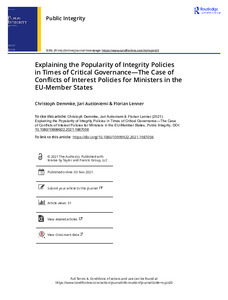Explaining the Popularity of Integrity Policies in Times of Critical Governance : The Case of Conflicts of Interest Policies for Ministers in the EU-Member States
Demmke, Christoph; Autioniemi, Jari; Lenner, Florian (2021-11-03)
Demmke, Christoph
Autioniemi, Jari
Lenner, Florian
Taylor & Francis American Society for Public Administration
03.11.2021
Julkaisun pysyvä osoite on
https://urn.fi/URN:NBN:fi-fe2021111054614
https://urn.fi/URN:NBN:fi-fe2021111054614
Kuvaus
vertaisarvioitu
©2021 The Author(s). Published with license by Taylor and Francis Group, LLC. This is an Open Access article distributed under the terms of the Creative Commons Attribution-NonCommercial-NoDerivatives License (http://creativecommons.org/licenses/by-nc-nd/4.0/), which permits non-commercial re-use, distribution, and reproduction in any medium, provided the original work is properly cited, and is not altered, transformed, or built upon in any way.
©2021 The Author(s). Published with license by Taylor and Francis Group, LLC. This is an Open Access article distributed under the terms of the Creative Commons Attribution-NonCommercial-NoDerivatives License (http://creativecommons.org/licenses/by-nc-nd/4.0/), which permits non-commercial re-use, distribution, and reproduction in any medium, provided the original work is properly cited, and is not altered, transformed, or built upon in any way.
Tiivistelmä
Current critical governance trends raise important questions for scholars in the field of integrity policies. Currently, scholars agree that governance trends show declining trends in the fields of democracy, human rights, justice, rule of law, corruption, conflicts of interest, politicization, protection of privacy, equality, and freedom of the press. These trends exist in many countries, albeit to a different degree. On the other hand, one can also observe an expansion of integrity policies. In the field of conflicts of interest (CoI), for more than a decade, CoI-policies have become ever more comprehensive and sophisticated. Countries implement ever more policies, introduce stricter standards and invest more in the implementation of CoI policies. CoI policies become more complex and the institutionalization and management of CoI policies more professional. In view of these seemingly paradoxical trends, the purpose of this article is to discuss the relationship between these critical Governance trends and integrity policies. We discuss the case of conflict of interest policies for Ministers/Secretaries. We conclude that trends toward critical governance fit with the expansion of integrity policies for various reasons, but mostly because they are (increasingly) used as useful political instruments for various political interests.
Kokoelmat
- Artikkelit [2609]
